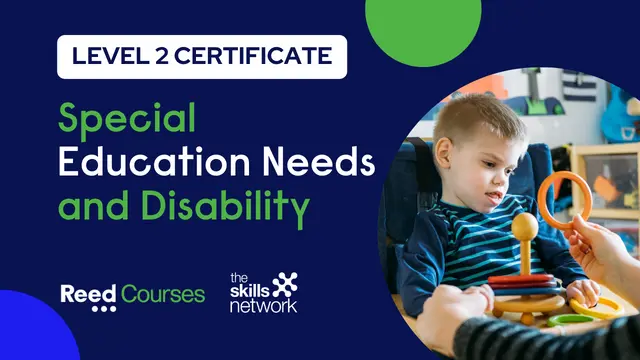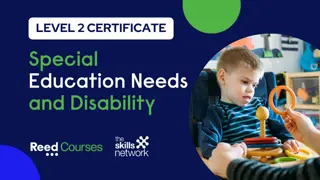
Level 2 Certificate in Special Education Needs & Disability
Accredited Level 2 Qualification | Unlimited Tutor Support | Free Digital E-Certificate
Reed Courses
Summary
If you are 19 years old or older and living in England, the course will be free to you as it is...
- Tutor is available to students
Overview
Are you passionate about making a difference in the lives of individuals with special educational needs and disabilities?
If so, this Level 2 Certificate in Special Education Needs and Disability is ideal for you.
You'll explore many different aspects of SEND, including the symptoms of specific conditions, legislation and guidance applicable to individuals with SEND, and how such conditions affect individuals in daily life. This knowledge will be invaluable in your personal or professional life, whether you're seeking to improve your own understanding of SEND or looking to support others who are affected by it.
Benefits of studying
- Paper-based and online course options available
- Study from anywhere, at any time
- Gain an accredited level 2 qualification
- Nationally recognised
- Access to an award-winning e-learning platform
- Perfect for beginners
- Unlimited support from qualified tutors
- Receive a digital e-certificate upon completion
- No hidden costs
Reed Courses have partnered with The Skills Network, an online learning and skills training provider, to offer access to a range of Level 2 qualifications via distance learning.
Qualification
Description
Unit 1: Introduction to Special Educational Needs and Disability (SEND)
In this unit, learners will explore a range of SEND conditions and the causes of these, as well as the social and medical models of disability. They will also learn about barriers that individuals with SEND might face and positive changes that have occurred over time in relation to SEND.
- Section 1: Understand the different conditions categorised as SEND conditions
- Section 2: Understand different models of disabilities
- Section 3: Understand how the rights and support available to those with conditions categorised as SEND have changed over time
Unit 2: Understand equality and diversity in the context of SEND
Learners will look at equality, diversity and inclusion within the workplace, community and wider society, as well as exploring relevant legislation and guidance in relation to SEND. They will also learn about safeguarding and the legislation surrounding this, and the different types of abuse.
- Section 1: Understand the concept of equality and diversity
- Section 2: Understand legislation and guidance which supports individuals with Special Educational Needs and Disabilities (SEND)
- Section 3: Understand the importance of safeguarding an individual with Special Educational Needs and Disabilities (SEND)
- Section 4: Understand the benefits of a diverse and inclusive society for an individual with SEND
Unit 3: Principles of promoting person centred approach for individuals with SEND
Learners will learn about the person-centred approach in relation to send, and the importance of active participation for individuals. They will also look at well-being and how this can be promoted.
- Section 1: Understand person centred approaches
- Section 2: Understand the importance of encouraging active participation
- Section 3: Understand the importance of an individual’s well-being
Unit 4: Understanding SEND and learning
Learners will explore different learning styles and support programmes used in educational settings. They will also learn about reasonable adjustments and how Education, Health and Care (EHC) plans work.
- Section 1: Understand the importance of inclusive learning
- Section 2: Understand the use of support programmes for individuals with Special Educational Needs and Disabilities (SEND)
- Section 3: Understand the role of reasonable adjustments
- Section 4: Understand Education, Health and Care (EHC) plans
Unit 5: Living with Special Educational Needs and Disabilities (SEND)
Learners will learn about neurodiversity and self-identity, as well as how societal and cultural influences can impact on individuals with SEND. They will also look at the support available for individuals with SEND and their families, as well as the effects of stigma.
- Section 1: Understand the concept of neurodiversity
- Section 2: Understand the concept of the self
- Section 3: Understand the impact of societal and cultural influences on individuals with conditions categorised as SEND
- Section 4: Understand sources of support for individuals with SEND and the families
- Section 5: Understand the impact stigma has on individuals with Special Educational Needs and Disabilities (SEND).
Who is this course for?
This special educational needs and disability course is perfect for beginners and suits anyone looking to improve their understanding of SEND, whether it's to support others in their personal life, change careers, or progress in their current role.
Requirements
This Level 2 Certificate in Special Education Needs and Disability is fully funded by the government’s Adult Education Budget.
In order to qualify for funding, you must be:
- Aged 19 or over
- Reside in England
- Have been living in the EU for at least the last three years
- Not enrolling onto a course that you have already completed
Career path
This Level 2 Certificate in Special Education Needs and Disability will allow you to develop your abilities and stand out to employers in a range of fields - with further study allowing you to pursue roles such as:
- SEND Teaching Assistant
- SEND Coordinator (SENCO)
- SEND Nursery Nurse
- SEND Play Assistant
- Education Welfare Officer
Questions and answers
Reviews
Legal information
This course is advertised on reed.co.uk by the Course Provider, whose terms and conditions apply. Purchases are made directly from the Course Provider, and as such, content and materials are supplied by the Course Provider directly. Reed is acting as agent and not reseller in relation to this course. Reed's only responsibility is to facilitate your payment for the course. It is your responsibility to review and agree to the Course Provider's terms and conditions and satisfy yourself as to the suitability of the course you intend to purchase. Reed will not have any responsibility for the content of the course and/or associated materials.



